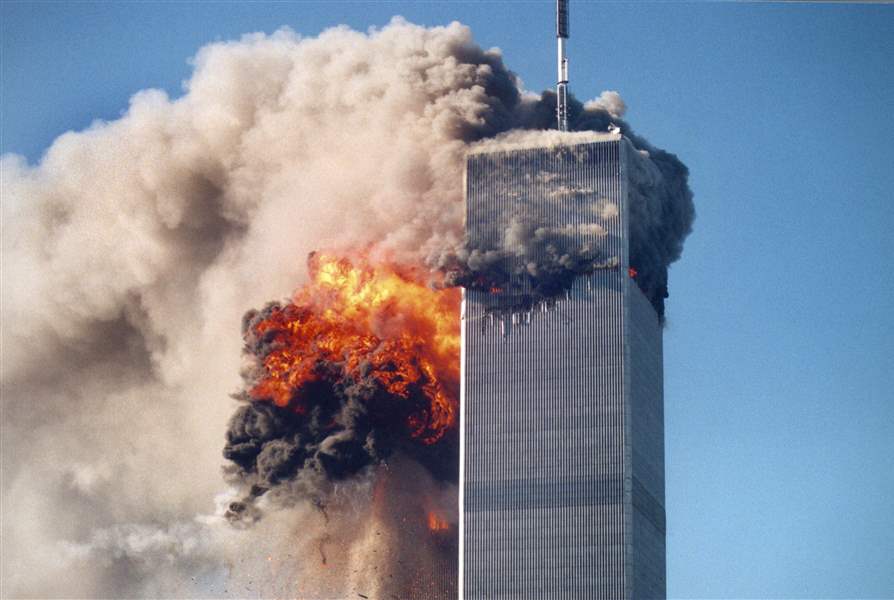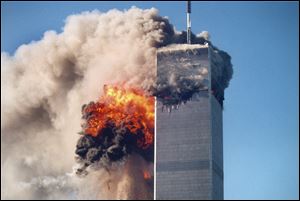
COMMENTARY
The day the world changed
9/11/2017

This photo by Roberto Robanne, provided in New York by the National September 11 Memorial & Museum, shows the impact of one of the airplanes during the World Trade Center attacks in New York, Sept. 11, 2001.
ASSOCIATED PRESS
Year by year, 9/11/2001 fades into history.
Today’s teenagers, assuming they’ve heard of 9/11 at all, probably bracket it along with World War II, Vietnam, and the Battle of Gettysburg. I'll bet they aren’t even sure which came first.
Those of us who were functional in 2001 see things differently. The day still lives vividly in our memories. How accurate these memories are is not easy to judge. Each time we look back at a past event, what we see is not the event itself but the last time we recalled it. Over time, our recollections grow progressively more fuzzy and faint, like a tape or a photocopy that’s been copied too many times. My memories are no exception.

This photo by Roberto Robanne, provided in New York by the National September 11 Memorial & Museum, shows the impact of one of the airplanes during the World Trade Center attacks in New York, Sept. 11, 2001.
So, what you read here is not a news story. But, for what it’s worth, it’s all true — as far as I can remember.
Sept. 11, 2001, was a beautiful day, warm, sunny, and cloudless — classic Indian summer. My wife and I were up early and took our dog Jack for a walk to Fort Meigs in Perrysburg. The phone was ringing as we came home. It was one of my Blade colleagues. “Do you know what’s going on?” she said. “Switch on the TV!”
We gaped as a passenger aircraft smashed into the World Trade Center in a spectacular cloud of smoke and flames. For a few seconds I marvelled, thinking, what is this — a disaster movie or a video game?”
Then a second plane hit the other tower. Reality set in. This was no movie, no game.
I was booked on a flight to England later that day. I tried to call and cancel. All the lines were busy, of course. I couldn’t go. Stories like this happen once in a lifetime. It became clear later on that I couldn’t have flown even if I’d wanted to. All air traffic had been instantly grounded.
At The Blade, the bosses decided to put out an Extra afternoon edition of the paper. The story kept unfolding, growing more enormous and hideous by the minute: Four airliners had been hijacked by a team of suicidal Arab terrorists. Two planes attacked Manhattan. One crashed into the Pentagon. Another — possibly headed for the White House — crashed into a field in Pennsylvania. Either of the latter incidents would have been massive stories in their own right, but with the Twin Towers disintegrating on TV, they were almost relegated to afterthoughts.
I don’t remember all that much about that Extra edition, except that newsroom teamwork kicked in and everyone did a spectacular job in a very short time. I wrote the front-page headline. “DAY OF HELL,” it said. Because that’s what Sept. 11, 2001, was to everyone who was there.
Sept. 11 changed America, the world, and our lives forever.
Among the lingering casualties was my personal taste for newspaper life. For more than 40 years, like most journalists, I’d enjoyed the newsroom drama, late nights, the challenge of handling big stories, no matter how harrowing.
But 9/11 knocked the journalistic stuffing out of me. Afterward, I felt I couldn't hack it anymore. I’d had enough of heart-rending accounts of tragedy, of sifting through piles of photographs and deciding which were too upsetting to print.
What I wanted was a nice, uneventful life. And I got it. But that’s another story.
Patrick O'Gara, a former Blade editor, now lives in Northern Spain. Contact him at:pogara@theblade.com.